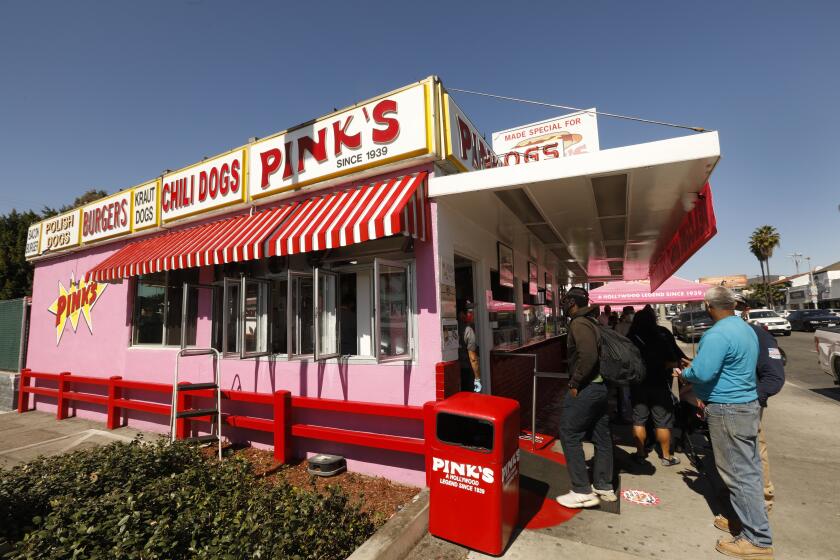Opinion: A dark drive of the soul

- Share via
A golf course in Encino. A phone call.
It’s my college roommate, from the East Coast. A friend has died.
“Oh, no.”
“But you don’t know how he died.”
I’m still playing.
“He was murdered ... by his son.”
“Oh my God.”
When you can’t make a dog joke on Montana Avenue, L.A.’s officially a tough room.
Approaching the 15th green, I tell my golfing partner the news, then sink a 24-foot putt for par.
“If you’d gotten that call three hours ago, you’d have had your best round ever.”
We laugh a lot.
It’s the drive home that wrenches me toward the casual atrocity of American life and my numb reaction to it. Like most emigres to L.A., I thought I’d put a continent between me and bad news from the old country. Now, 34 years after my move, the continent is tailgating me on Hayvenhurst Avenue.
I pull over to a red zone and consider the math that doesn’t add up: News of a murdered frat brother equals improved golf and big laughs?
This is not good. Sometime when I wasn’t looking, blanket immunity to shock dulled my nervous system.
And so begins — depending on traffic — my 40-minute quest to relearn the ability to be appropriately sickened.
Why are Angelenos so blasé about meeting their heroes? In my experience, they do not disappoint.
Turning onto Ventura, the idea arises that such pitilessness isn’t just me. A 1982 Chrissie Hynde lyric comes to mind: “The phone, the TV and the news of the world / Got in the house like a pigeon from hell.” Now it’s 2023, when we’re strung out on lockdowns, mass shootings, Proud Boys and the zillion et ceteras. Maybe disassociation is a symptom of nationwide survivor guilt?
It’s a reassuring but unsatisfying thought, an alibi for a high school druggie, a version of “everyone’s doing it.” This needs to get personal.
My friend. He was a good guy. Funny. Rough around the edges but sensitive. We bonded over the Bronx, where my grandparents lived and where he grew up. I’d seen him just twice since 1979 and got one call from him in the ’90s, re: estate planning. “Sorry. Already got a guy. No, I love living in L.A. Good hearing your voice, man.”
East of Haskell, I estimate that at the time of that call, his son — now sitting in a jail cell — would have been in grade school.
My mind instantly derails into a screenplay plot. Let’s say an accidental overdose of L.A. tap water empowers me with supernatural powers to see the future, leading to a second act of increasingly desperate attempts to save an old friend’s life. Wow, a less futuristic “Minority Report”!
You go from dreary Parsons Boulevard in Queens to Hollywood movie mogul but can’t feel your life.
I’d write it if not for the Writers Guild of America strike. I really should picket tomorrow. They say the Netflix picket line is tons of fun—
Wait. What?
This is scary, like my brain has developed hands-free emotional avoidance. Even scarier: I realize it’s nothing new.
Nearing Sepulveda, I consider the desensitizing impact of having had a Hollywood comedy writing career. I flash to 1997 when “woke” was just a verb and no joke was “too soon.” In (maybe) the darkest ever “Seinfeld” moment — the hospital scene in which Susan is pronounced dead from licking toxic wedding invitation envelopes bought on the cheap by her fiancé, George Costanza — George feigns grief and then says to Jerry, Elaine and Kramer: “Well, let’s get some coffee.”
I loved that scene so much. It made me proud to be part of the show. Now, passing the Skirball Cultural Center, I wonder if that was the first symptom of an emotional intake-valve shutdown.
No. A few years earlier, in the wake of Rodney King, the Northridge quake and O.J., I’d joked: “People say they wouldn’t move to L.A. because they’d miss the change of seasons. But L.A. has four seasons: Fire season, earthquake season, riot season and pilot season.”
You might think I’m about to pin some blame on Los Angeles for my unfeeling state, but I’m not. Turning onto Sunset, I don’t want to blame anyone or anything, especially not this great city. When “How did I get this way?” turns to “Whose fault?” all is lost.
Stopped in another red zone, I Google my friend. The horrific news pops right up. Shot twice in the head, once in the chest, once in the abdomen.
As a hobbyist comedian, I do a joke about a man who “died peacefully in his sleep after being shot four times in the head and twice in the chest.” There should be a restraining order on how close comedy can hit home.
But this is all about hitting home. I need this to hit home.
Over speed bumps on Amalfi, I think back to 1975 and my friend throwing incredibly long Frisbee passes on Fraternity Row. How he tied my tie for the spring formal. How he laughed like a car with dual exhaust pipes.
Turning onto my street, I go where I really don’t want to go: imagining him holding his infant son in the delivery room, the farthest thing from his mind being, “Someday, this gurgling little boy will ...”
Home.
Peter Mehlman’s latest novel is “#MeAsWell.” He was a writer and producer on “Seinfeld.”
More to Read
A cure for the common opinion
Get thought-provoking perspectives with our weekly newsletter.
You may occasionally receive promotional content from the Los Angeles Times.











